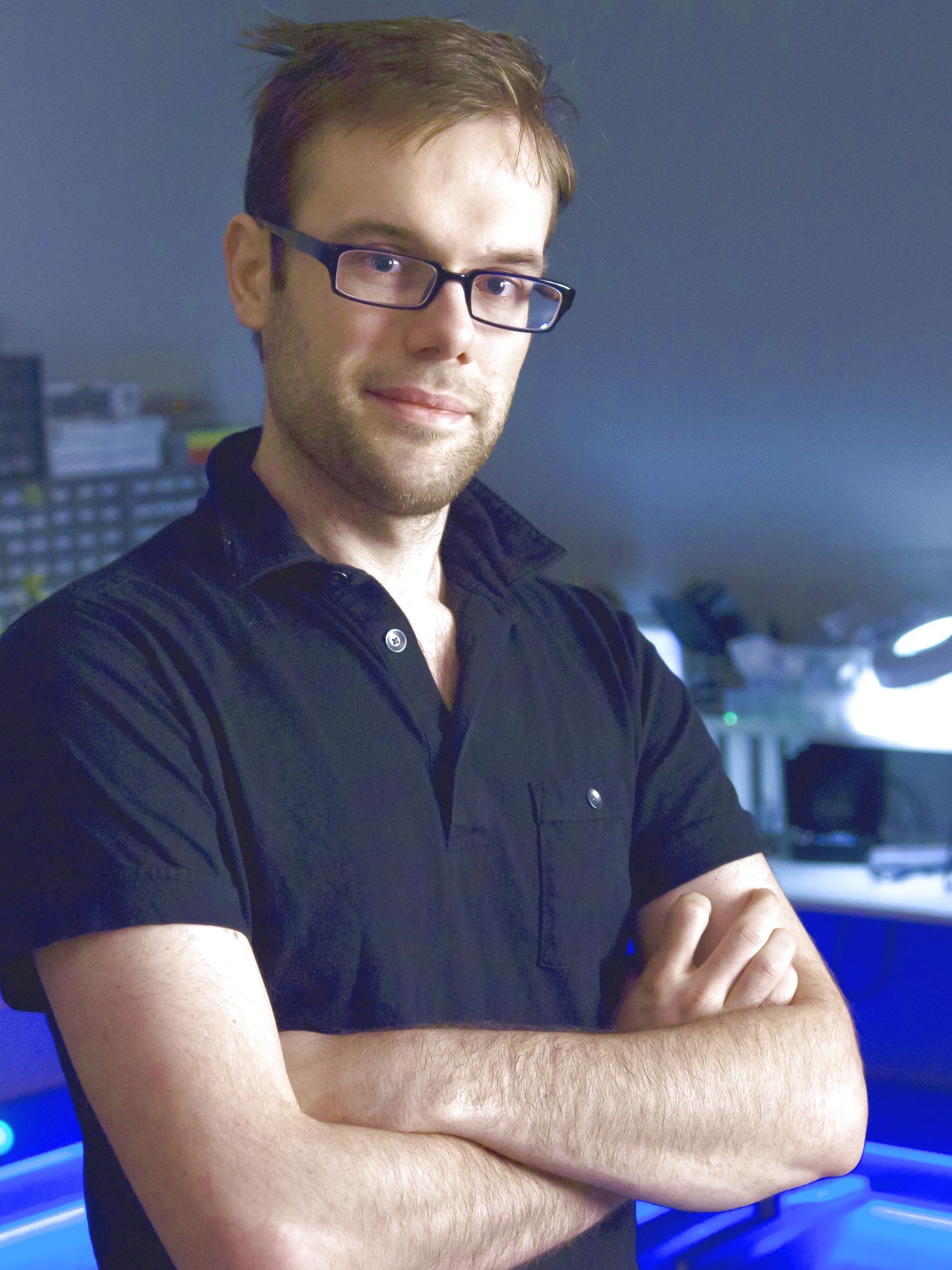Technology Review Names Carnegie Mellon's Chris HarrisonTo Prestigious TR35 List of Top Young Innovators
Byron SpiceTuesday, August 21, 2012Print this page.

Ph.D. Student Explores Human-Computer Interaction Using Skin, Sound, Surfaces
PITTSBURGH-Chris Harrison, a Ph.D. student in Carnegie Mellon University's Human-Computer Interaction Institute (HCII) who develops new ways for people to interact with digital devices, particularly when they are on the go, has been recognized by MIT's Technology Review as one of the world's top 35 innovators under the age of 35.
Harrison, 28, focuses on finding alternatives to the keyboard and mouse people typically use to control computers. Using combinations of sound and vision sensors, he has enabled people to control digital devices by tapping on tables, walls or even their own skin. These new input techniques can add nuance and convenience to human-computer interaction and dramatically increase the utility of small, mobile devices.
"Computing is everywhere these days, but we often find ourselves using new devices the same way we use our old computer," said Justine Cassell, HCII director. "Chris has a vision of how interfaces to computing power need to change as our computing environment changes, and the technical skills for making his ideas work in the real world. I can't think of a better addition to the TR35 pantheon."
Harrison was selected for the 2012 TR35 list by a panel of expert judges and the editorial staff of Technology Review, who evaluated more than 250 nominations. All of the TR35 winners for 2012 will be featured in the September/October issue of Technology Review and online at www.technologyreview.com/tr35/.
"This year's TR35 recipients are applying technology to some of our generation's greatest challenges, and innovating to improve the way we live and work," said Jason Pontin, editor-in-chief and publisher of Technology Review. "We look forward to watching these young technology leaders grow and advance over the coming years."
Harrison will join other TR35 honorees in discussing their achievements at the EmTech MIT 2012 conference, at the MIT Media Lab in Cambridge Oct. 24-26.
Earlier this summer, Harrison was selected as one of 40 recipients worldwide of a highly competitive 2012 Google Ph.D. Fellowship. Google launched the fellowship program four years ago to recognize outstanding graduate students in computer science and related disciplines. Fellows are reimbursed for tuition and fees, receive a $32,000 annual stipend and work with a mentor from Google Research.
Also this year, he and a fellow HCII student, Robert Xiao, secured a $100,000 Qualcomm Innovation Fellowship on behalf of HCII.
A native of England who grew up in and around New York City, Harrison joined the HCII Ph.D. program in 2007 after earning his undergraduate and master's degrees in computer science at New York University. Since then, he has produced a string of innovations, including:
- Lean and Zoom, a technology for automatically adjusting the magnification of a computer monitor based on a person's distance from the screen;CMU's QoLT Foundry has since commercialized it;
- Scratch Input, a means of controlling devices by tapping or stroking tabletops or whiteboards;
- Minput, which turns a small mobile device into its own computer mouse;
- Skinput, a method for controlling devices by tapping buttons projected on a person's own skin, which he helped develop while interning at Microsoft Research;
- OmniTouch, a Kinect-based system that turns almost any surface into a touchscreen;
- and Touché, a new sensing technique he helped develop as part of a team at Disney Research, Pittsburgh, that enables objects to sense how they are being touched.
"My training and my inspiration come from the people that I work with," Harrison said. "The graduate students in our HCI Ph.D. program are the smartest bunch of students in the world. They inspire me every day, and my adviser, Scott Hudson, does the same. It's not an accident that I'm able to create these new technologies. It's the environment that I'm in."
HCII is part of Carnegie Mellon's School of Computer Science. Follow the school on Twitter @SCSatCMU.
About Carnegie Mellon University: Carnegie Mellon (www.cmu.edu) is a private, internationally ranked research university with programs in areas ranging from science, technology and business, to public policy, the humanities and the arts. More than 11,000 students in the university's seven schools and colleges benefit from a small student-to-faculty ratio and an education characterized by its focus on creating and implementing solutions for real problems, interdisciplinary collaboration and innovation. A global university, Carnegie Mellon's main campus in the United States is in Pittsburgh, Pa. It has campuses in California's Silicon Valley and Qatar, and programs in Africa, Asia, Australia, Europe and Mexico. The university is in the midst of "Inspire Innovation: The Campaign for Carnegie Mellon University," which aims to build its endowment, support faculty, students and innovative research, and enhance the physical campus with equipment and facility improvements.
About Technology Review, Inc.: Technology Review is leading the global conversation about technologies that matter. An independent media company owned by the Massachusetts Institute of Technology (MIT), more than 4.5 million business leaders, innovators, thought leaders and early adopters around the globe read our publications, in five languages and on a variety of digital and print platforms. We publish Technology Review magazine, the world's longest-running and most respected technology magazine (established 1899); daily news, analysis, opinion, and video; and Business Reports, which explains how new technologies are transforming companies, disrupting markets, or creating entirely new industries. Technology Review also produces live events such as the annual EmTech MIT and international EmTech conferences, Technology Summits and Salons. The publication's entrepreneurial community organization, the MIT Enterprise Forum, hosts events around the world.
For More Information
Byron Spice | 412-268-9068 | bspice@cs.cmu.edu
